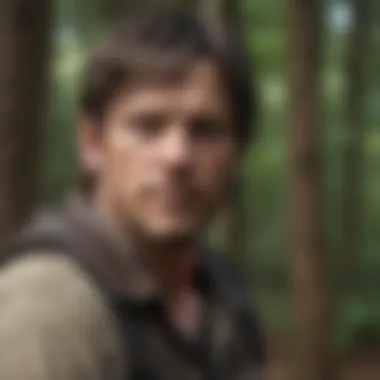Daryl Dixon: Exploring the Modern Anti-Hero


Intro
Daryl Dixon stands out prominently as a character in a universe where zombies roam and survival is a daily battle. He’s not just a fighter; he’s presented as a complex figure who navigates the moral quagmires of a post-apocalyptic world. The Walking Dead, a series that has captivated audiences for over a decade, introduces Daryl as more than a simple survivor. His journey—a rich tapestry of hardship, loyalty, and transformation—offers a lens through which we can scrutinize not only his character but also broader themes in storytelling today.
In this exploration, we will untangle the threads of Daryl's story, focusing on various aspects that make him compelling. The analysis includes his relationships with others in the series, the moral dilemmas he faces, and the larger implications his character has on current narratives in television. With a keen eye, we’ll shine a light on how Daryl’s development reflects significant societal issues, bridging the gap between fiction and the human experience.
But first, let’s establish the context within which Daryl exists—both the culture of the medium he inhabits and the evolution of the anti-hero in modern storytelling.
Prelude to Daryl Dixon
Daryl Dixon stands as one of the most compelling figures in the modern landscape of television, particularly within the universe of The Walking Dead. His character serves not only as a member of the ragtag group of survivors but also embodies the complexities and moral ambiguities often associated with a modern anti-hero. An exploration of Daryl’s character provides insights into the thematic elements of survival, loyalty, and the human condition in dire circumstances.
Understanding Daryl's origins and his role within the narrative allows readers to appreciate the depth of his character, which reflects broader societal issues and personal struggles. Through his journey, audiences grapple with questions of morality, kinship, and the ever-pressing instinct to survive—a reflection of humanity itself. The examination of Daryl Dixon is essential as it invites discussions about how characters evolve in extreme contexts and how these transformations resonate with viewers.
Origins of the Character
Daryl Dixon first popped up on the small screen during the early seasons of The Walking Dead, originally portrayed as a rough-edged, loner type whose survival instincts were honed in a world ravaged by the undead. It’s interesting to note that Daryl, unlike many of his companions, wasn't a character from the source comic. Instead, he was a product of creativity that allowed the show to explore new avenues of character-driven storytelling. His relationship with Merle, his older brother, set a foundation for his complexity; Daryl's struggles with family loyalty, fear of abandonment, and self-identity often clash with the harsh reality of a post-apocalyptic world.
As the series progressed, Daryl evolved, transitioning from a frigid survivor to a character steeped in vulnerability and profound emotional complexity. His portrayal offers a lens into the human psyche during crises, compelling the audience to empathize with his actions and motivations even when they are flawed or morally ambiguous.
The Role Within 'The Walking Dead'
In The Walking Dead, Daryl Dixon acts as both a survivor and a moral compass of sorts, navigating through relentless terrain filled with threats, whether from the undead or fellow humans. He embodies traits that resonate deeply with viewers, such as resilience and loyalty. Notably, his bond with other characters—especially Carol and Rick—highlights the significance of chosen family amidst chaos.
His ability to stand apart, yet still be integral to the group dynamics showcases how anti-heroes often operate. Daryl's actions frequently challenge the viewer's preconceived notions of right and wrong, allowing for an exploration of moral ambiguity. In this morally grey landscape, Daryl embodies the struggle to retain humanity while navigating a world that often pushes individuals to their limits.
"Daryl's story is the story of many: how do we hold onto who we are when everything around us is crumbling?"
Daryl Dixon is not just a character; he’s a vessel for understanding the complexities of human behavior under extreme pressure. His role goes beyond mere survival; it's an exploration of identity, relationships, and the gray areas of morality that come into play in a world overrun by threats both familiar and alien.
Character Traits and Development
Daryl Dixon stands out as a pivotal character in the fabric of the post-apocalyptic landscape of The Walking Dead. Examining his character traits and development reveals the layers that make him more than just a survivor in a world filled with walkers; he embodies the struggles of loyalty, survival, and the ever-looming shadow of vulnerability. Each trait enhances our understanding of not just Daryl but the shared human experience during desolation.
Loyalty and Trust
At the heart of Daryl's persona is an unwavering sense of loyalty. From the onset, his interactions speak volumes about the bonds he forms. Whether with fellow survivors like Carol or the ever-looming danger that defines the group dynamic, Daryl's readiness to protect those he cares about sets him apart. This trait speaks to something deeply relatable; the lengths someone would go to for family. Daryl's complex backstory adds further depth to this loyalty, often tempered by past betrayals and mistrust. His past is haunted by abandonment and loss, leading to a fierce dedication to those he chooses to care for.
"Daryl is a character who epitomizes the idea that love can be shown through action, not words."
He demonstrates this when he defies the odds to rescue his friends, showcasing that trust is not merely given; it must be cultivated through actions over time. This complexity reinforces Daryl's role within the group as the unwavering backbone, the one who refuses to abandon his own, no matter how dire the circumstances.
Survival Instincts
In a world and setting where instinct can often be the thin line between life and death, Daryl Dixon embodies raw survivalism. His exceptional skills in hunting, tracking, and navigating this bleak landscape are not just for sustenance but also serve as a testament to his adaptability. Daryl often seems like a man who relies on sheer will and instinct rather than strict morality, which highlights a significant point of debate among viewers regarding his character.
Survival for Daryl isn't just about food; it's about maintaining a semblance of humanity amidst chaos. His choices, often ethically ambiguous, put the viewer in a moral quandary, challenging them to question what survival truly means in a world devoid of rules. Daryl's instincts also reflect his emotional struggles—his actions are sometimes driven by impulsive reactions to previous traumas and loss—a nuanced portrayal that adds heft to his anti-hero status.


Complexity and Vulnerability
The complexity of Daryl Dixon is perhaps his most captivating trait, revealing layers of vulnerability that are rarely associated with traditional heroes. While his rugged exterior and reputation as a lone wolf project strength, his character arc depicts a man plagued by humanity's fallout. This duality becomes evident through moments of introspection and his interactions with other characters.
For instance, Daryl's relationship with Carol showcases a deep emotional core, revealing not just affection but also profound anguish stemming from their shared experiences. His vulnerabilities often make the audience question his capacity for growth and redemption. We relate to his struggles, recognizing that behind the bow and arrows, there's a man grappling with loss, uncertainty, and the desire to belong.
As viewers navigate his journey, they are reminded that even the toughest warriors are shaped by their wounds. Daryl's complexities challenge stereotypical notions of masculinity and heroism, propelling him into the realm of thoroughly human characters who live, love, and lose while constantly battling their inner demons.
This detailed look into Daryl's character traits and development emphasizes the significance of his journey and the textured storytelling that has captivated audiences around the globe.
Relationships with Other Characters
Daryl Dixon's character development is profoundly influenced by his relationships with others. It’s not just about surviving a zombie apocalypse; it’s about the connections he forms or fails to form along the way. The complexity and depth of Daryl's character come alive through his interactions, showing how pivotal these relationships are in shaping his identity as a modern anti-hero. Audience engagement often deepens through these bonds, reflecting larger themes of humanity, community, and resilience.
The Importance of Family
Family ties wield significant weight in Daryl's storyline. Though he is portrayed as a lone wolf, the notion of family runs deep within him, catalyzing significant choices he makes. From the onset, his relationship with Merle, his older brother, offers insight into Daryl's backstory and influences his loyalty and subsequent actions.
Daryl's internal struggle surrounding familial bonds is palpable. For him, family often translates to a complicated mix of loyalty, disappointment, and a yearning for acceptance. His relationship with Carol highlights this. Initially, they both tread lightly around their vulnerabilities, yet as their friendship blooms, they allow each other to confront their pasts. It underlines a pivotal theme: that family can sometimes extend beyond blood ties.
"Loyalty that comes from family is like an anchor; it keeps you grounded in turbulent times.”
Friendships and Alliances
Daryl also navigates various friendships and alliances throughout his journey, which is essential to the narrative arc in 'The Walking Dead'. His bond with Glenn stands as a notable example. Glenn represents the counterbalance to Daryl's rough exterior, and their friendship evolves from mutual respect into a brotherhood forged by shared struggles. Together, they showcase the navigation of friendships that strive for trust even in the bleakest circumstances.
Moreover, Daryl's alliance with Rick Grimes cements his role within the group, pushing him into leadership and camaraderie. The dynamics of these friendships not only establish community but also reflect on Daryl himself. His willingness to step up for others showcases his growth, evolving from a reluctant member of the group to someone who deeply values their survival and unity. In many ways, these alliances act as a protective net, challenging his often solitary tendencies.
Antagonistic Relationships
Conversely, Daryl's interactions with antagonistic characters reveal another layer of his personality. His chemistry with Negan, for instance, embodies the conflict between good and evil, yet it spins the thread of complexity in Daryl’s character. While Daryl might despise Negan’s methods, there’s a grudging respect that forms over their confrontations, illustrating how opponents can simultaneously inspire growth while also driving one’s choices.
Similarly, the tension with characters like the Saviors gives insight into Daryl's moral compass. Engaging with antagonists often forces Daryl to confront his boundaries. It’s not just about physical survival; these encounters push him to reckon with his ideals and his willingness to compromise. Navigating these relationships also serves to highlight how Daryl embodies many anti-hero traits, oscillating between vengeance and forgiveness, showcasing the duality within his heroism.
Overall, as Daryl Dixon traverses the unforgiving landscape of 'The Walking Dead', his relationships with other characters provide depth to his narrative. They sculpt him into a multifaceted anti-hero whose journey resonates well beyond the screen, inviting viewers to reflect on their own experiences of connection and conflict.
Themes Explored Through Daryl
Daryl Dixon stands as a compelling character within The Walking Dead, embodying various themes that resonate with the audience. Each theme highlights a facet of his journey, allowing us to see not just the man fighting for survival, but also a reflection of human nature itself. Exploring these themes sheds light on the moral quandaries, emotional struggles, and existential dilemmas that define Daryl and, by extension, the viewers' experiences in a post-apocalyptic world.
Morality in a Post-Apocalyptic World
In The Walking Dead, morality isn't a clear-cut matter—it's a labyrinth where every decision carries weighty consequences. Daryl's character navigates this moral grey area, often wrestling with choices that can either save his friends or doom them. This struggle exemplifies the concept of morality in dire conditions, where traditional rules and ethics become tangled in chaos.
For instance, consider the episode where Daryl must decide whether to rescue a stranger or protect his own group. Choosing the latter reveals a kind of moral pragmatism essential for survival, raising questions about the price of loyalty versus altruism. Daryl's actions prompt viewers to reflect on their own values: what would you do when survival hinges on tough choices?
"In the end, it’s not about what’s right or wrong. It’s about who’s left standing."


The Search for Redemption
Beyond mere survival, Daryl's narrative is a poignant exploration of redemption. Throughout the series, he carries the burden of his past—his involvement in the darker side of humanity's struggle for existence weighs heavily on him. His journey echoes the age-old quest for forgiveness and self-acceptance, pursuing a path that often pits his better instincts against his prior transgressions.
The moment Daryl starts protecting others, especially characters like Beth and Carol, marks a significant turn in his arc. These relationships serve as a lifeline, allowing him to confront his demons while nurturing a sense of belonging. This theme of redemption speaks volumes about the human condition; the desire to atone is a universal one, transcending the horrific backdrop of the narrative.
Isolation versus Community
In a world teetering on the edge of anarchy, the tension between isolation and the need for community is ever-present in Daryl's life. Initially an outsider, he embodies the lone wolf archetype—self-reliant and guarded. However, as he becomes intertwined with the group, this isolation begins to erode, revealing the vital role of community in providing strength and hope.
A particularly telling moment is when Daryl risks himself for the sake of the group during various confrontations. His actions reflect a shift from solitary survival to collaborative existence. This transformation emphasizes the importance of social bonds in a seemingly fractured reality. Whether through fierce loyalty to his friends or the painful sacrifices he makes, Daryl showcases how communities can foster resilience against the unforgiving world.
Daryl Dixon as an Anti-Hero
Daryl Dixon stands out as a quintessential representation of the anti-hero archetype within modern television. Unlike traditional heroes, who typically embody strength, integrity, and unwavering morality, Daryl offers a more intricate portrait. His persona encapsulates the complexities of survival in a world stripped of societal norms. In this light, understanding Daryl's character as an anti-hero enhances one's grasp of the challenging themes pervading ‘The Walking Dead.’ His journey not only reflects individual struggles but also mirrors broader societal issues that resonate with audiences across different cultures.
By examining Daryl through the lens of an anti-hero, we can explore themes of moral ambiguity, personal redemption, and the role of community in a fragmented world. This exploration not only sheds light on his internal conflicts but also the influence he has on the narrative. Daryl’s decisions often teeter on a fine line between right and wrong, a hallmark of anti-heroic behavior that invites viewers to ponder the very nature of morality.
Defining the Anti-Hero Archetype
The anti-hero character archetype often defies the conventions of classic heroism. These characters typically exhibit flawed traits such as selfishness, insecurity, or a penchant for violence, while still managing to garner audience empathy. Daryl Dixon epitomizes this archetype through his gritty survival tactics, complexity of emotions, and emotional distance from others.
In contrast to the noble hero, the anti-hero generally operates in shades of gray. Audiences can view his actions as morally questionable yet relatable. Daryl's character illustrates this by making choices that, while desperate, often resonate with viewers' experiences of hardship or loss. His journey embodies elements of redemption, reflecting an individual's capacity to strive for a better self even amidst personal failings.
Here is a breakdown of characteristics common among anti-heroes, with Daryl as a prime example:
- Flawed Morality: Daryl engages in tactics that can be classified as ruthless, yet are often justified as necessary for survival.
- Reluctant Leadership: Unlike traditional heroes who seek power or control, Daryl often prefers to work in the shadows, leading only when forced to protect those he cares for.
- Emotional Depth: Underneath Daryl's rugged exterior lies emotional turmoil and vulnerability that he gradually reveals, adding depth to his character.
"The most interesting characters are often those who grapple with their inner demons, and Daryl Dixon is no exception."
Daryl's Ambivalence
What truly solidifies Daryl Dixon’s status as an anti-hero is his ambivalence towards his own actions and their implications. He frequently finds himself at a crossroads where he must choose between his instinct for survival and the moral dilemmas that arise from his choices. This defines his character arc throughout the series, establishing him as a relatable figure who symbolizes the struggles of humanity in dire circumstances.
Daryl's internal conflict is seen through various scenarios, where his choices raise profound questions about justice, guilt, and the human capacity for change. For example, his response to situations— whether to utilize violence or seek alternatives— showcases a nuanced view of morality shaped by his past experiences. Instead of being a static hero, he evolves through the series, reflecting a realistic portrayal of personal growth under pressure.
This ambivalence not only makes Daryl a compelling character but also challenges viewers to reflect on their values. In a world where the line between right and wrong is often blurred, Daryl embodies the struggle of many individuals who face difficult choices, making him a relatable hero for those navigating gray areas in their own lives.
Impact on Audience and Cultural Representation
The character of Daryl Dixon serves as a potent catalyst for discussions surrounding both audience sentiment and cultural portrayals in contemporary television. His persona reflects the disillusionment and survivalist mentality commonly found in modern narratives, enabling viewers to connect deeply with his challenges and triumphs. In examining Daryl's journey, we gain insights into the unique ways he resonates with fans while also influencing broader themes in visual storytelling.
Fan Reception and Icon Status
Daryl Dixon has cemented himself as a cultural icon within the realm of television. The character, portrayed by Norman Reedus, shifted the landscape of anti-heroes in media. With his rugged demeanor, expertise with a crossbow, and a complex mix of vulnerability and toughness, Daryl defies traditional hero archetypes.
His popularity skyrocketed largely due to his multifaceted personality, which allows audiences to see various aspects of the human experience—fear, resilience, loyalty, and moral ambiguity. Fans have embraced Daryl not just as a character, but as a representation of struggle and endurance. Perhaps this is why merchandise ranging from collectibles to clothing featuring his likeness sells like hotcakes, indicating a deep-seated connection people feel towards him.


Many fans take to platforms such as Reddit to discuss his evolution and impact, debating moments that defined his arc. His storyline resonates on levels that often transcend the boundaries of the show; many see him as a symbol of hope amidst despair. This climatic reception manifests through numerous fan art and tributes, thus solidifying his status as a beloved character in pop culture.
Cultural Significance in Modern TV
Daryl serves as a crucial lens through which viewers can analyze contemporary societal issues. His character navigation through a world fraught with danger and ethical dilemmas mirrors the real-life challenges many face today. The themes encapsulated in Daryl's character—from isolation to the quest for belonging—reflect broader societal dynamics and contribute to the urgent conversations needed in the world today.
The shifting portrayal of masculinity in Daryl's character is also worth noting. He is not depicted solely as a brutish warrior, but rather as an individual shaped by his circumstances, defined by emotional depth and personal struggles. In a time when hyper-masculinity is often showcased, Daryl presents a more nuanced exploration of what it means to be strong.
"Daryl Dixon’s journey in ‘The Walking Dead’ is more than just survival; it’s about looking within and embracing the vulnerability that makes us human."
Thus, the character surpasses the boundaries of a typical television anti-hero. He embodies the complexities of modern life and offers a mirror to our imperfections and aspirations. Through Daryl Dixon, viewers are urged to reflect not just on narratives of survival but also on the values that underpin them. His lasting impact underscores the necessity of depth in character development and storytelling.
The End
In totality, the analysis of Daryl's impact on audience and culture within the context of modern TV exemplifies how a single character can alter perceptions and serve as a vessel for broader discussions. His journey touches on themes that resonate deeply across different demographics, showcasing the relevance of well-crafted characters in a rapidly changing cultural landscape.
The Influence of Daryl's Character on Storytelling
Daryl Dixon serves as a pivotal figure in shaping contemporary narratives, particularly within the framework of television storytelling. His character not only contributes to the thematic depth of 'The Walking Dead' but also influences wider trends within the horror and drama genres. In analyzing Daryl, one can pinpoint the evolution of storytelling techniques that have emerged due to his presence on screen. His complexity resonates with audiences, initiating a dialogue far beyond mere entertainment.
Character-Driven Narratives
One of the most significant ways Daryl's character influences storytelling is through the trend of character-driven narratives. In an era where plot often trumps character development, Daryl stands out as an embodiment of depth and growth. Initially introduced as a rough and rugged survivalist, his journey transforms him into a nuanced individual confronting personal demons and sociocultural challenges. This character evolution invites viewers to engage on a more profound level, promoting empathy and reflection.
- Engagement Through Complexity: Daryl embodies the idea that a character can possess both strengths and vulnerabilities. His loyalty, masked by personal trauma, splits the audience's allegiance between admiration and sympathy. This duality compels viewers to invest emotionally in his choices, enriching the narrative experience.
- Themes of Survival and Humanity: Daryl's arc serves as a lens for examining larger themes like mortality and redemption. His experiences challenge the viewer to consider what it means to be human in a world that prioritizes survival over morality. This not only deepens character engagement but also elevates the storytelling to address ethical dilemmas faced by society.
- Interpersonal Dynamics: Daryl's relationships act as fertile ground for narrative exploration. His interactions with characters such as Carol and Rick foster themes of camaraderie amidst chaos, forging narrative paths that showcase character interdependence. This interwoven storytelling approach alters traditional narrative structures, pivoting the focus from external conflict to internal growth.
Shaping Genre Conventions
Daryl Dixon also plays a crucial role in shaping genre conventions, particularly in the landscape of post-apocalyptic storytelling. His character disrupts the archetypal mold commonly seen in this genre, presenting an opportunity for redefinition.
- Subversion of Stereotypes: Rather than fitting the usual hero archetype, Daryl's rugged exterior and emotional depth illustrate a new form of anti-hero. This challenges genre norms and offers alternative perspectives that resonate with a thirst for more authentic portrayals.
- Moral Ambiguity: The ambiguity surrounding Daryl's choices pushes against the grain of clear-cut moral storytelling. Audiences are frequently left to ponder his decisions, reflecting real-life complexities that aren't always black and white. This layered storytelling enhances viewer engagement, inviting them into a more critical conversation about heroism and morality.
- Inspiring Future Characters: Finally, Daryl's influence extends beyond 'The Walking Dead.' As a recognizable character, he inspires writers across various media to explore flawed protagonists. The landscape of television is shifting; ideological barriers are breaking down in favor of characters who provoke thought and reflection.
"Daryl Dixon's character illuminates the narrative landscape, steering storytelling toward a realm of authenticity and emotional weight."
The End: The Legacy of Daryl Dixon
The character of Daryl Dixon has firmly entrenched himself into the annals of pop culture, representing a prototype of the modern anti-hero. To understand his legacy within the fabric of contemporary storytelling necessitates looking beyond mere plot devices, delving into the layers that shape the audience's affinity for him. His complexities resonate with the challenges we face in our own lives, reflecting the thin line between right and wrong, loyalty and betrayal, individuality versus community.
Enduring Popularity and Cultural Assessment
Daryl's enduring popularity can be traced back to several compelling factors. First, his development from a secondary character to a key figure illustrates how well-crafted storytelling can transform the seemingly ordinary into the extraordinary. Viewers have witnessed his transition from a lone wolf, shaped by trauma and self-reliance, to a character grounded in loyalty and connection. This evolution mirrors the audience's desire for growth and redemption, making him a relatable figure in extreme situations.
In terms of cultural assessment, Daryl embodies the intricate dance between masculinity and vulnerability. His rough exterior is juxtaposed with moments of profound introspection and kindness. This balance appeals to fans who appreciate depth over archetypes, allowing for a richer character study. Moreover, Daryl has become a symbol of resilience. As society grapples with instability, his narrative creates a sense of hope, suggesting that survival is possible even amidst chaos.
"Daryl Dixon's journey captures the essence of human tenacity, appealing not just to fans of horror, but to anyone confronting personal battles."
Anticipating Future Narrative Directions
Looking ahead, there seems to be limitless potential in Daryl's narrative trajectory. The impending developments—related to his relationships, moral dilemmas, and identity—hint at further exploration of his psyche. The show’s fans anticipate how Daryl will continue to navigate the shifting landscape of alliances and enmities. It's expected that as new threats arise, so too will the complexity of his decisions. Will he remain the steadfast leader, or will the world force him to confront his principles?
Additionally, there is a palpable interest in how Daryl’s character might be utilized in spin-offs or related media. The forthcoming series could examine different facets of his personality that were only hinted at before. This opens the door for delving into his past, motivations, and deeper connections with other characters. Such avenues would not only serve existing fans but could attract new viewers, expanding his legacy.
In summary, the significance of Daryl Dixon extends far beyond the screen. He serves as a lens through which society's fears, hopes, and desires are reflected. The complexities of his character, coupled with the way his journey mirrors themes of survival and redemption, ensure that Daryl will leave an indelible mark on the landscape of television narratives for years to come.



